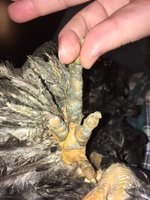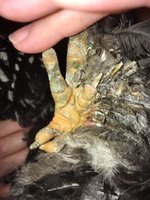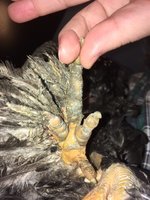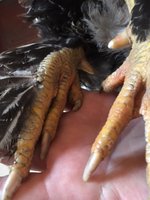Hennisee
In the Brooder
- Mar 25, 2017
- 15
- 0
- 22
My standard Cochin cockerel got locked out of the coop 3 nights ago when the temp was about -8 Celsius along with one of my bantams. He was in a sheltered spot but hasn’t been the same since. I brought him inside last night when it was obvious he wasn’t going to get on his perch. He is not eating or drinking much. Has had one small poop that looks normal. He is very wobbly on his legs and they are shaking when he stands.
The OEG bantam is drinking and eating and though a little listless with one droopy eyelid, appears to be fine.
The OEG bantam is drinking and eating and though a little listless with one droopy eyelid, appears to be fine.










